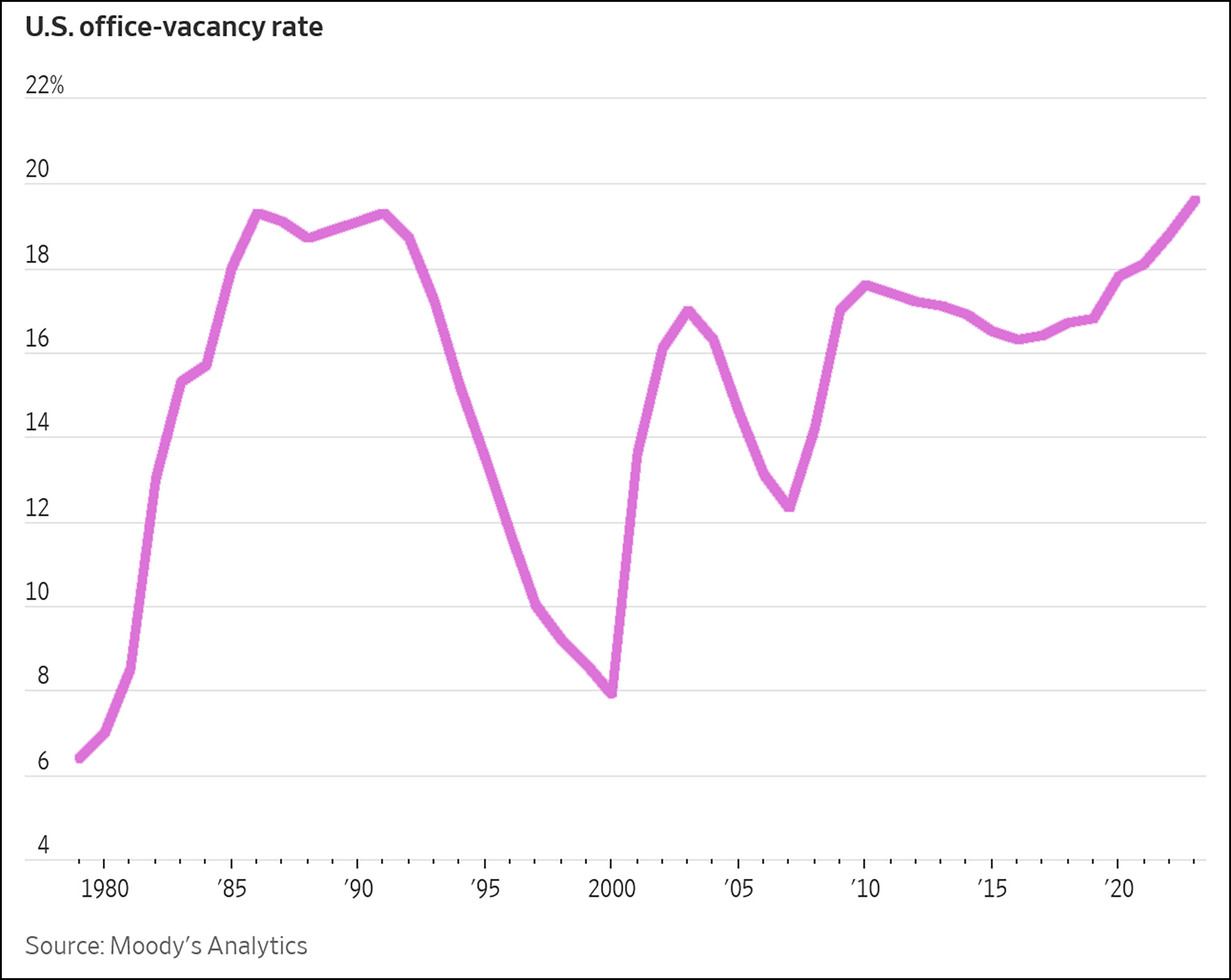The Wall Street Journal reports today that office vacancies are at their highest level since records began:
A staggering 19.6% of office space in major U.S. cities wasn’t leased as of the fourth quarter, according to Moody’s Analytics, up from 18.8% a year earlier. That is slightly above the previous records of 19.3% set in 1986 and 1991 and the highest number since at least 1979, which is as far back as Moody’s data go.
Leases are a lagging indicator. They're usually signed on a long-term basis, so even when workers stop coming into the office the space remains under contract for years. Eventually, though, the leases expire and they don't get renewed. That's been happening ever since 2020 and there's no reason to think it won't continue. Evidence suggests that the number of office workers has declined by half since the start of the pandemic, and leased space has nowhere near caught up to that.
As you can see in the chart, unleased space peaked previously in 1986, four years after the end of the Reagan recession—and that recession didn't see nearly the drop in office workers that we've seen in recent years. Even if big companies start requiring more workers to come in, we still have a long way to go before leasing catches up—and in the meantime that's going to be a big drag on the economy.


And yet productivity increased 5.2% in Q3. I guess those lazy at home workers are actually, you know, working.
Make $280 per hour. Getting a job is not easy. In any case, you have access to a wealth of resources to help you with your work style. Become motivated to promote hundreds of jobs through job boards and vx40 career websites.
Take a look at this................................. https://careershome74.blogspot.com/
See? It's already working!!!
And it will get worse before it gets better. Why? There are office buildings being completed that now have no tenants. How long will they be vacant? 1 or 2 years? Longer?
Or forever. There was an office building built on spec in Springfield, VA on the basis of all those workers moved to Fort Belvoir but it never got a tenant for five years or so and now it's being torn down to build a data center on the property instead.
maybe i need to lease an office to live in.
So what? It's the "creative destruction" of the market!! (in whose name we prey). As kahner notes, people may start leasing office space as living space. Why not? Prices will adjust depending on what buyers will pay; landlords who made bad decisions will feel the pinch (or get wiped out). That's just how it works.
Of course when the rich cry for relief, they're much more likely to get governmental attention and assistance. That's a feature that has to be fixed.
To wit, DC's Mayor Bowser: https://www.reddit.com/r/washingtondc/comments/191mory/dchr_screwing_us_all/
"It is up to us to serve as an example for other large employers in the District."
Bowser is presumably hearing it from downtown business interests who desperately need people to be back and working downtown in order to survive.
Sounds to me like CRE holders need to tighten their belts, tug on those bootstraps, and ask themselves how they can better serve the needs of this modern economy.
Get with it or get left behind, that's the American way.
four years after the end of the Reagan recession...
So four year into the Reagan expansion, KD?
For a while now I've reading at some site, can't remember where, that in office working was going to return to pre-COVID levels and the work from home was a fad that would fade. Again, wish I could remember that site. Can I get any help here?
The retired class, especially those living on "safe" investments like CRE, is not being asked to waste their life commuting in order to prop up "safe" investments for the(ir) greater good.
You'd think capitalist cheerleaders would celebrate more efficient business coordination that wastes fewer resources.
????????
It was jabber-something... It'll come to me.
Sure, a lack of foot traffic creates problems for businesses catering to them. But entertainment businesses (e.g. night clubs, bars, sit down dining) are doing fine in the center of these areas.
But you know, a part of the problem is that most building owners simply do not or cannot slash their leases to incentivize businesses to stay in their current space. If there's an asset bubble waiting to happen, it could be office buildings.